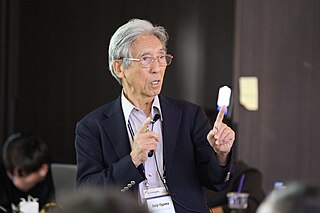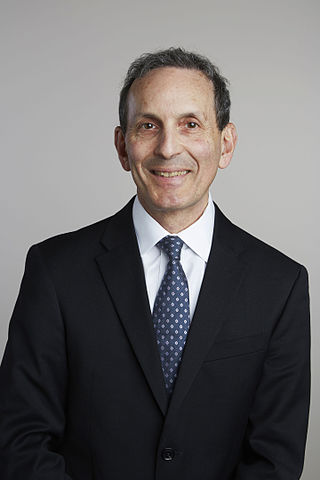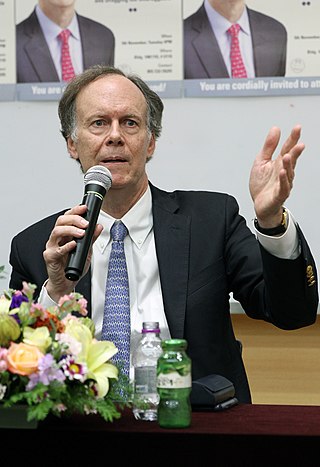The Gairdner Foundation is a non-profit organization devoted to the recognition of outstanding achievements in biomedical research worldwide. It was created in 1957 by James Arthur Gairdner to recognize and reward the achievements of medical researchers whose work contributes significantly to improving the quality of human life. Since the first awards were made in 1959, the Gairdner Awards have become Canada's most prestigious medical awards, recognizing and celebrating the research of the world’s best and brightest biomedical researchers. Since 1959, more than 390 Canada Gairdner Awards have been given to scientists from 35 countries; of these recipients, 98 have subsequently gone on to win a Nobel Prize.
The Canada Gairdner International Award is given annually by the Gairdner Foundation at a special dinner to five individuals for outstanding discoveries or contributions to medical science. Receipt of the Gairdner is traditionally considered a precursor to winning the Nobel Prize in Medicine; as of 2020, 98 Nobel Prizes have been awarded to prior Gairdner recipients.

Edward Donnall "Don" Thomas was an American physician, professor emeritus at the University of Washington, and director emeritus of the clinical research division at the Fred Hutchinson Cancer Research Center. In 1990 he shared the Nobel Prize in Physiology or Medicine with Joseph E. Murray for the development of cell and organ transplantation. Thomas and his wife and research partner Dottie Thomas developed bone marrow transplantation as a treatment for leukemia.
Moses Judah Folkman was an American biologist and pediatric surgeon best known for his research on tumor angiogenesis, the process by which a tumor attracts blood vessels to nourish itself and sustain its existence. He founded the field of angiogenesis research, which has led to the discovery of a number of therapies based on inhibiting or stimulating neovascularization.

Oliver Smithies was a British-American geneticist and physical biochemist. He is known for introducing starch as a medium for gel electrophoresis in 1955, and for the discovery, simultaneously with Mario Capecchi and Martin Evans, of the technique of homologous recombination of transgenic DNA with genomic DNA, a much more reliable method of altering animal genomes than previously used, and the technique behind gene targeting and knockout mice. He received the Nobel Prize in Physiology or Medicine in 2007 for his genetics work.

Seiji Ogawa is a Japanese biophysicist and neuroscientist known for discovering the technique that underlies Functional Magnetic Resonance Imaging (fMRI). He is regarded as the father of modern functional brain imaging. He determined that the changes in blood oxygen levels cause its magnetic resonance imaging properties to change, allowing a map of blood, and hence, functional, activity in the brain to be created. This map reflected which neurons of the brain responded with electrochemical signals to mental processes. He was the first scientist who demonstrated that the functional brain imaging is dependent on the oxygenation status of the blood, the BOLD effect. The technique was therefore called blood oxygenation level-dependent or BOLD contrast. Functional MRI (fMRI) has been used to map the visual, auditory, and sensory regions and moving toward higher brain functions such as cognitive functions in the brain.

James Edwin Darnell Jr. is an American biologist who made significant contributions to RNA processing and cytokine signaling and is author of the cell biology textbook Molecular Cell Biology.

Richard Marc Losick is an American molecular biologist. He is the Maria Moors Cabot Professor of Biology at Harvard University and a professor at the Howard Hughes Medical Institute. He is especially noted for his investigations of endospore formation in Gram positive organisms such as Bacillus subtilis.

Arthur L. Horwich is an American biologist and Sterling Professor of Genetics and Pediatrics at the Yale School of Medicine. Horwich has also been a Howard Hughes Medical Institute investigator since 1990. His research into protein folding uncovered the action of chaperonins, protein complexes that assist the folding of other proteins; Horwich first published this work in 1989.

Shizuo Akira is a professor at the Department of Host Defense, Osaka University, Japan. He has made ground-breaking discoveries in the field of immunology, most significantly in the area of innate host defense mechanisms.
Jack Hirsh is a Canadian clinician and scientist specializing in anticoagulant therapy and thrombosis.
Alan Bernstein is Professor Emeritus at the University of Toronto and President Emeritus of the Canadian Institute for Advanced Research (CIFAR), where he served as President and CEO from 2012 to 2022. A Distinguished Fellow at the Munk School of Global Affairs and Public Policy, he is also a Fellow and Member of the Standing Committee for Science Planning at the International Science Council (2022-2025). Canadian Bernstein is recognized as a leader in health research, science policy, mentorship and organizational leadership.

Michael R. Hayden, is a Killam Professor of Medical Genetics at the University of British Columbia, the highest honour UBC can confer on any faculty member. Only four such awards have ever been conferred in the Faculty of Medicine. Dr. Hayden is also Canada Research Chair in Human Genetics and Molecular Medicine. Hayden is best known for his research in Huntington disease (HD).

Lynne Elizabeth Maquat is an American biochemist and molecular biologist whose research focuses on the cellular mechanisms of human disease. She is an elected member of the American Academy of Arts and Sciences, the National Academy of Sciences and the National Academy of Medicine. She currently holds the J. Lowell Orbison Endowed Chair and is a professor of biochemistry and biophysics, pediatrics and of oncology at the University of Rochester Medical Center. Professor Maquat is also Founding Director of the Center for RNA Biology and Founding Chair of Graduate Women in Science at the University of Rochester.

Daniel Joshua Drucker is a Canadian endocrinologist. A Fellow of the Royal Society, he is a professor of medicine at the Lunenfeld-Tanenbaum Research Institute, Mount Sinai Hospital, Toronto. He is known for his research into intestinal hormones and their use in the treatment of diabetes, obesity, and other metabolic diseases, as well as intestinal failure.
Stuart Holland Orkin is an American physician, stem cell biologist and researcher in pediatric hematology-oncology. He is the David G. Nathan Distinguished Professor of Pediatrics at Harvard Medical School. Orkin's research has focused on the genetic basis of blood disorders. He is a member of the National Academy of Sciences and the Institute of Medicine, and an Investigator of the Howard Hughes Medical Institute.

Gregg Leonard Semenza is a pediatrician and Professor of Genetic Medicine at the Johns Hopkins School of Medicine. He serves as the director of the vascular program at the Institute for Cell Engineering. He is a 2016 recipient of the Albert Lasker Award for Basic Medical Research. He is known for his discovery of HIF-1, which allows cancer cells to adapt to oxygen-poor environments. He shared the 2019 Nobel Prize in Physiology or Medicine for "discoveries of how cells sense and adapt to oxygen availability" with William Kaelin Jr. and Peter J. Ratcliffe. Semenza has had ten research papers retracted due to falsified data.

William G. Kaelin Jr. is an American Nobel laureate physician-scientist. He is a professor of medicine at Harvard University and the Dana–Farber Cancer Institute. His laboratory studies tumor suppressor proteins. In 2016, Kaelin received the Albert Lasker Award for Basic Medical Research and the AACR Princess Takamatsu Award. He also won the Nobel Prize in Physiology or Medicine in 2019 along with Peter J. Ratcliffe and Gregg L. Semenza.
The North American Vascular Biology Organization (NAVBO) is a scientific society promoting knowledge exchange in the area of vascular biology. The society organises several international scientific meetings annually which broadly cover the areas of development of blood and lymphatic vasculature, cardiovascular and lymphatic disease, vascular matrix biology and vascular bioengineering.
King Kennard Holmes is an American physician, microbiologist, epidemiologist, and medical school professor. He is an internationally recognized expert on sexually transmitted diseases, especially HIV/AIDS.











